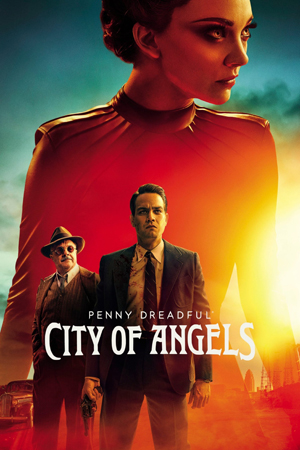Penny Dreadful: City of Angels is the best show on television that you are not watching. Unfortunately, this miniseries is only available on the Showtime premium cable channel, so the reach is not matching the quality of this production. There is no fictional television show currently airing that is as timely and important as this miniseries. Every major societal crisis we are currently facing – save for the pandemic – is addressed in Penny Dreadful: City of Angels, but it does so from a historical perspective and with new players that add depth and immediacy to current failings.
At its core, Penny Dreadful: City of Angels deals with the discovery of an entire Hispanic family murdered, with their bodies staged – ritually displayed – to call attention to the crime. It is 1938 and Santiago “Tiago” Vega (played by Daniel Zovatto) is the first, newly hired, Mexican-American detective on the Los Angeles Police Force. He has been assigned his first partner, Jewish detective Lewis Michener (played by Broadway legend Nathan Lane). Two outsiders on the police force tasked with solving a crime that will no doubt have ramifications for the heavily Mexican community where the murders took place.
It should be said here that Penny Dreadful: City of Angels is not your typical noir crime drama. As part of the Penny Dreadful franchise, there were bound to be supernatural elements and those make themselves known right from the start. As the series opens, migrant workers, including his father, perish in a devastating field fire as young Tiago watches from the safety of a truck. The fire began because of a battle between two supernatural sisters – a devil character (one of four roles played by the incredible Natalie Dormer) and the folklore deity, Santa Muerte (beautifully brought to life by Lorenza Izzo). As Tiago runs to save his father, Santa Muerte saves him – forever marking him with a scar his mother believes is a sign that he (and the family) are being watched over.

The plot of Penny Dreadful: City of Angels incorporates many threads. Some may even feel it is too many, but the way they are woven together makes for such a powerful mosaic. Just a sampling of the large scale issues on display here are: racial tensions within the police force as well as between the police and the community they are sworn to protect, the rise of a Nazi underbelly within America, the role of Evangelical religion during this period, and the history of eminent domain claims on minority property/land. Meanwhile the list of more personal crises addressed is even longer, including: inter-racial and inter-faith romantic relationships, religious faith vs losing spirituality, the plight of immigrant maids, the flourishing Pachuco identity, homosexuality and the dangers of/need for the closet, depression/suicidal behaviors, and sibling rivalry, just to name a few.
Through it all, Natalie Dormer embodies four totally different characters – each of them radically evil in distinct ways. Or perhaps they are all the same character meant to represent the spread of hatred, violence, and fear as it takes root in American ideology. Without a doubt Dormer deserves an Emmy nomination for these roles – each is so unique and evokes a visceral feeling of dislike from the audience and yet, it is impossible to take ones eyes off of her. I would be remiss if I didn’t also mention Adriana Barraza, one of the greatest Mexican actresses, who here provides the heart of this story as the matriarch of the Vega Family.
Despite this being a historical piece, anti-Trumpian motifs abound through the ten episodes that make up this first season. These filmmakers have their finger on the pulse of the nation and they want to add their voice to the mix. In short, if you have the opportunity to watch Penny Dreadful: City of Angels, do not pass it up. It is another story about people of color here in America that must be told. If we continue to tell these tales, maybe the message will finally resonate.
